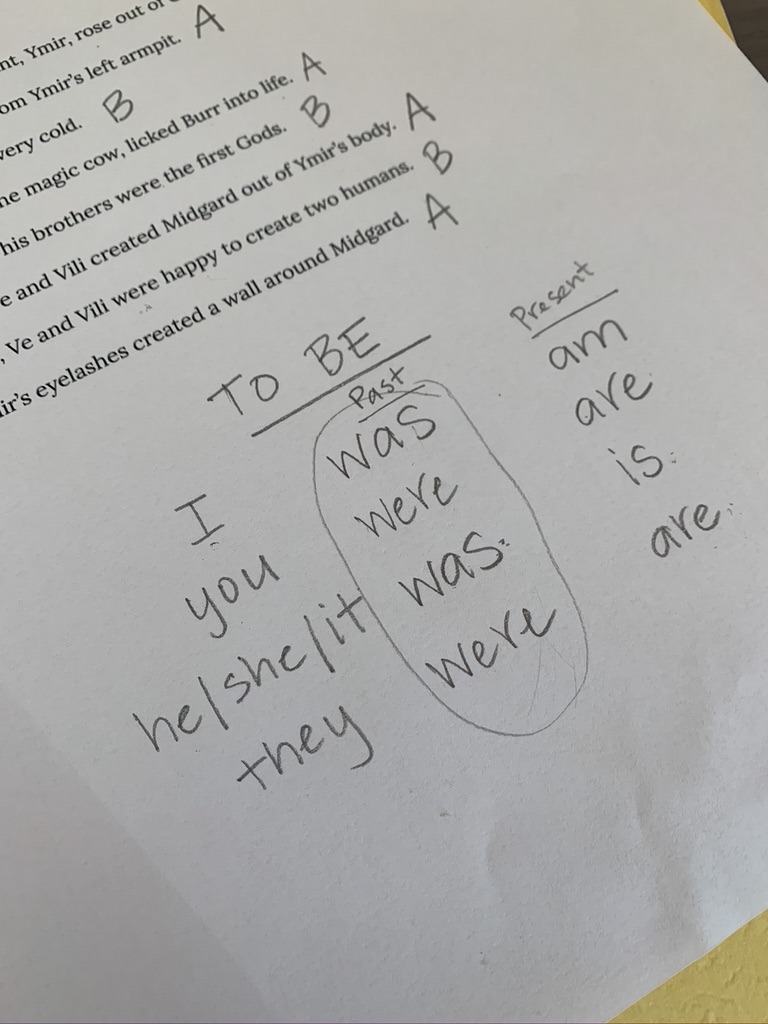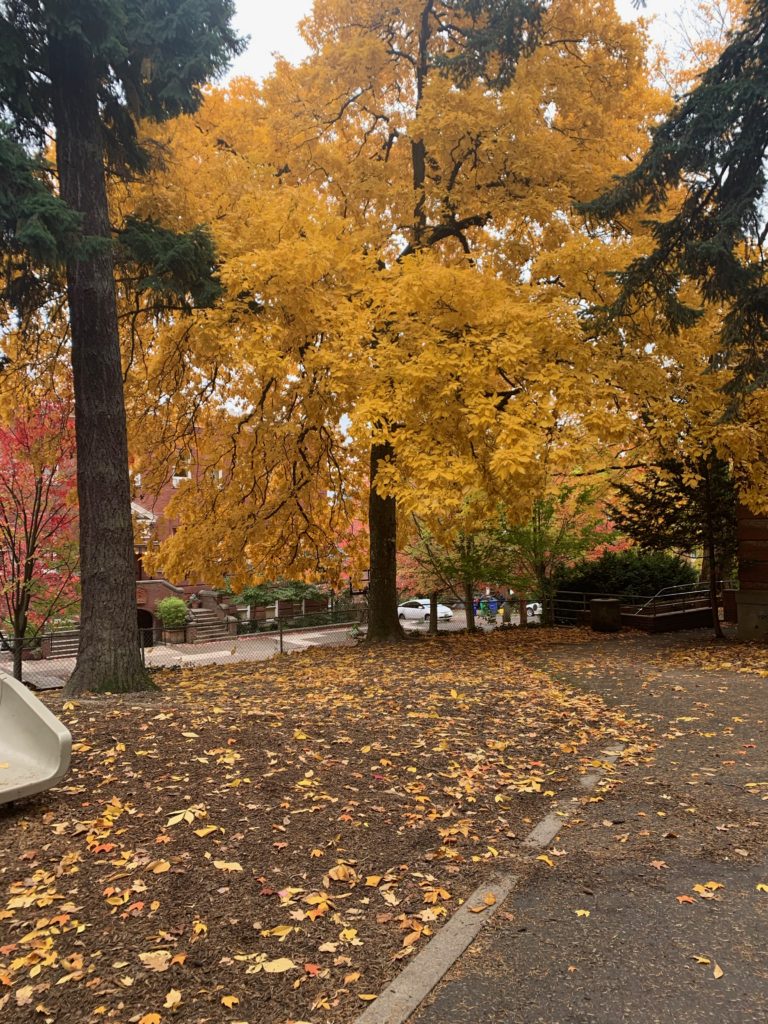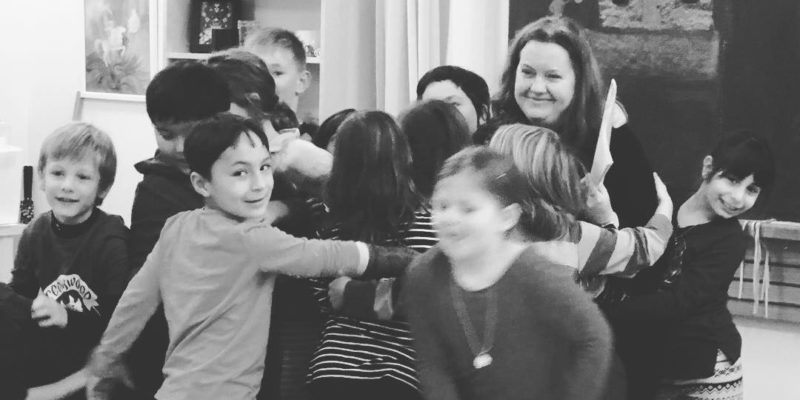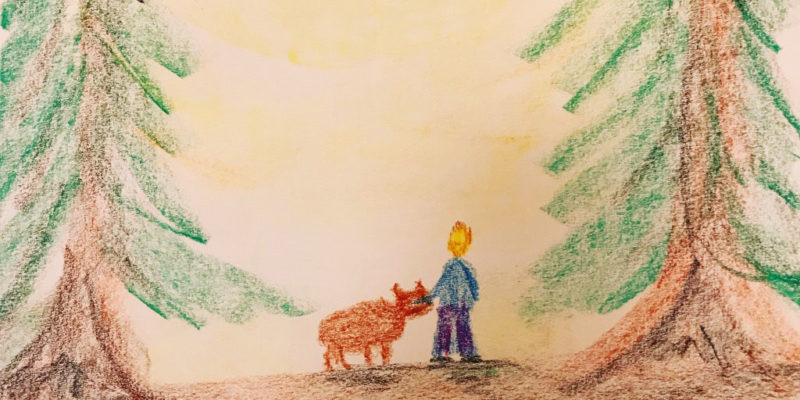You might know that I started my teaching career, way back when, teaching middle school. When I first started teaching, I was blown away by the amazing Waldorf curriculum and I gave it an enormous amount of my attention. I was fascinated and completely inspired as I explored the content, filling in the gaps of my own education and watching my students’ eyes light up with the stories they heard.
But when I started teaching in the lower grades, I realized that this amazing curriculum is really just the medium for skill-building. These kids needed to learn how to DO things! Yes, the stories are great, but these days it is the skills that my students gain as we explore, that are most important.

Since realizing this, I’ve watched my younger students grasp hold of the imaginative content (whatever it might be) and work with it, building reading, writing, public speaking, drawing and so many other skills along the way.
And though it might feel a little disheartening to know that any old story could provide this medium just as well, take heart. Anyone who has told Greek Myths to fifth graders or Hebrew Legends to third graders can attest that there is true magic in this developmental curriculum.
So hold on to the magic, but the point here is that we should not lose sight of the fact that building skills is an incredibly important part of our task as elementary school teachers.
Language Arts Practice in Waldorf Grade 4
Okay, okay. So what does language arts skill-building look like in fourth grade this year? Here’s a brief picture. (Also, I’ll remind you, we are currently holding our classes via Zoom — no in-person instruction right now.)
Spelling
I’ve written before about my approach to spelling, which is primarily through our daily dictation practice. I LOVE dictation (truly, click through to read more about how it works) but here’s why I love it so much.
- Practice spelling with imagination. No dry lists of words to memorize. (Just as an example, our dictation for yesterday was, “In the early morning of time, there was a land of frozen fog called Niflheim.” Just try writing that without activating your imagination!)
- Practice common words frequently. I mean, how many times are you going to put “because” on your spelling list?
- Present your students with beautiful writing that isn’t just copying from the board. Copying teacher writing is something that Waldorf teachers hold onto for far too long. We want our students to write, but we also don’t want them to get stuck with simple writing. Dictation is a great way to keep your students active and avoid the trap of copying teacher writing from the board, without any student initiative.
I will also say that our daily dictation habit is SO strong that I couldn’t imagine having class without it. Dictation is the transition as we move from our active circle work to more focused learning time. This serves the students in their skills, but it also helps me by providing a guidepost in our lesson every day. If it was a busy weekend, and I don’t have time to prepare ANYTHING else, I’ve got to have the dictation.
Free Workshop: 3 Classroom Management Strategies Every Waldorf Teacher Needs to Know
Register Now!
Composition
When we were together in the classroom, throughout 3rd grade, the students wrote their own independent compositions every single week (usually on Tuesday). Even in the spring, when our lessons were written out in plans that the parents would deliver, those plans included a weekly composition.
I knew this rhythm lived strongly in my students when this year, after one of our Monday lessons, a quick-thinking student left a comment in Google Classroom predicting what our Tuesday composition assignment would be.
Though it made me smile a bit to know that my students were so secure in our rhythm, now that we’re working on Zoom, I’ve had to rethink things a bit. I’ve held the goal of a weekly composition, but we’ve taken weeks off. I’m realizing that four hours of Zoom per day is pretty demanding and I don’t want them to have any work to do outside of that. (I haven’t been terribly successful at this so far, but I’m trying.)
Phonics and Grammar
Though there are certainly phonics and grammar lessons that naturally appear in our composition or dictation work, I do plan ahead specific grammar and phonics content and craft lessons around it.

For example, right now we are focusing on verbs. We’re exploring different types of verbs (active verbs and being verbs) and next week we’ll start working on verb tenses. This content gets 10-15 minutes of our attention in every lesson. It doesn’t take a lot of time, but it is important that these lessons are planned out, otherwise there’s a chance that I’ll miss something.
Language is a strength of mine, so I naturally see opportunities for bringing language arts lessons in our every day experiences. But even so, I don’t rely on these naturally occurring lessons to bring all of the grammatical content that we need to cover. And if language arts is more of a challenge for you (like math is for me) you really need to be certain you’re planning out those lessons.
Reading
Tracking my students’ reading is something that is really changing now that we’re in 4th grade. In 2nd and 3rd grade, I read with them and they had occasionally reading charts that they took home and filled in. It worked in those grades, but this year is different.
The fact is that a LOT of my students have been bitten by the reading bug and they are reading all the time. And though I know that those kids don’t need me to oversee their reading development, there are students in the class who do. So I’m putting together a reading program that includes a combination of assigned books and free-reading (with book reports or reviews.)
I’m still in the process of pulling that together, and I’ve done a number of different things over the years, so I’ll keep you posted about what I settle on.
The Takeaway
So I hope you’re getting from this post that it is important to plan for your students’ skill-building. Though most students’ skills will naturally develop, as they explore interesting content, you can’t completely rely on this. Your job as a teacher is to have a plan for their skill-development, that is more specific than just presenting interesting lessons and hoping for the best.
What are some of your favorite skill-building routines? Do you have a favorite approach to reading? Share in the comments — I’d love to hear!





Leave a Reply